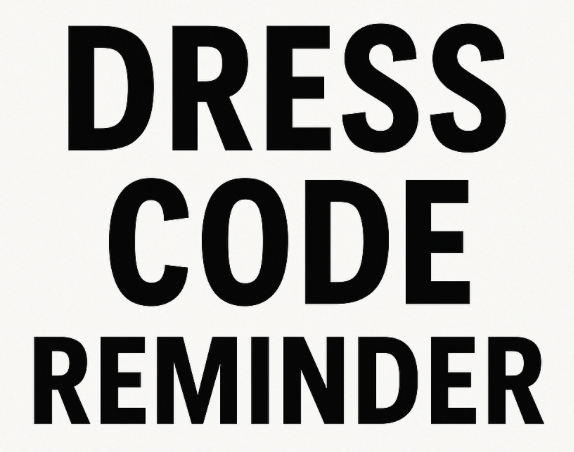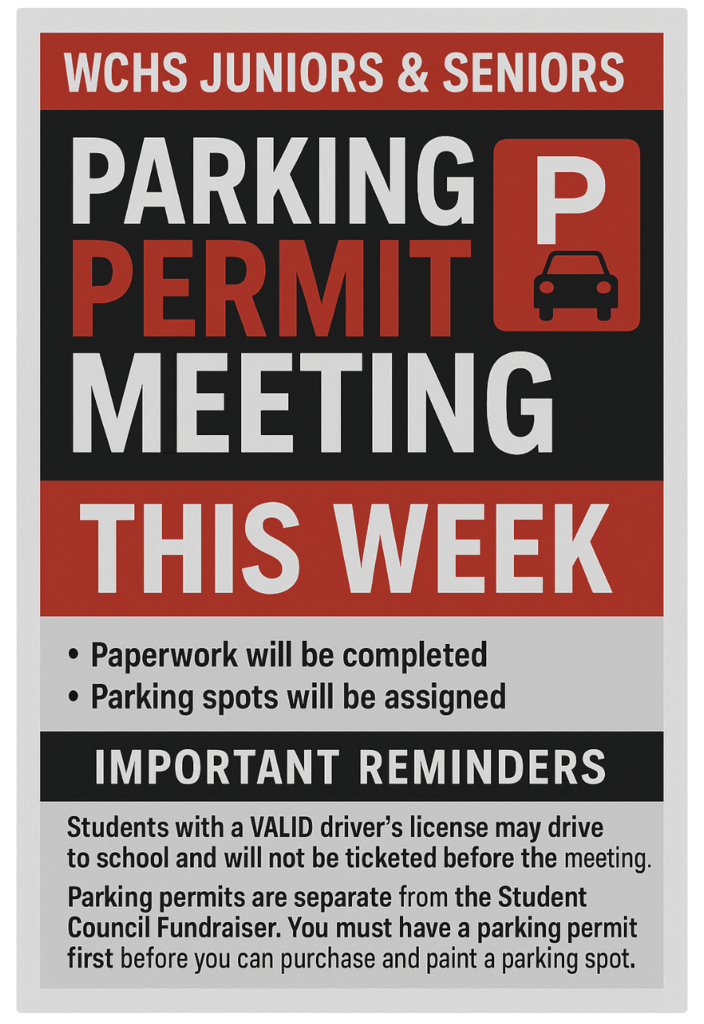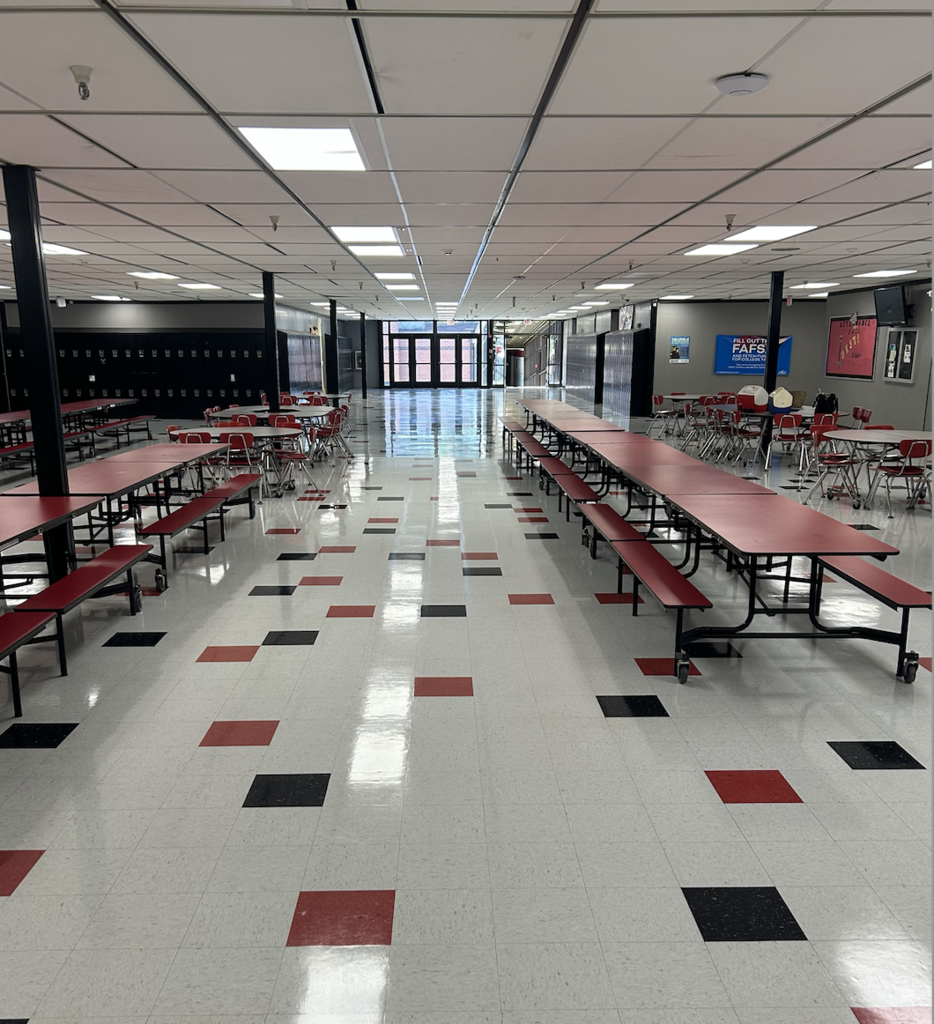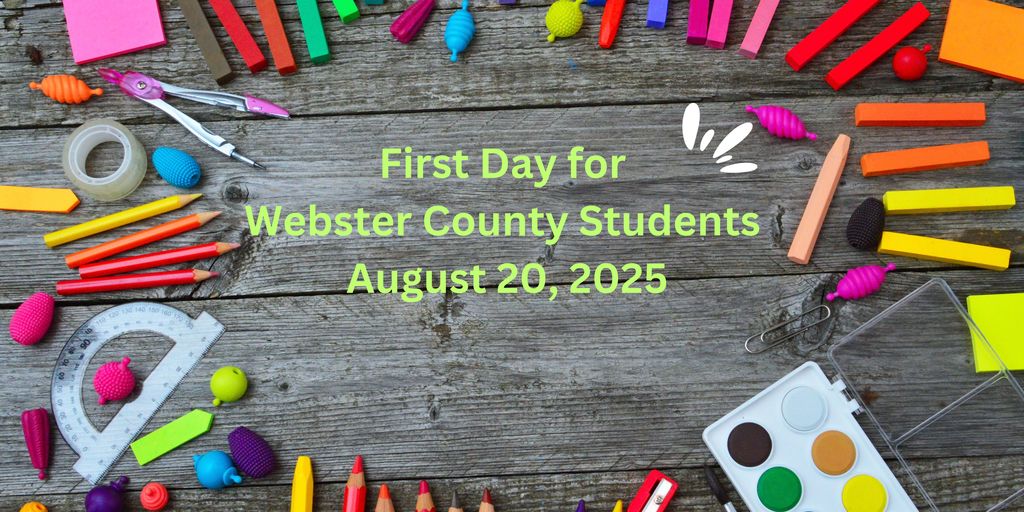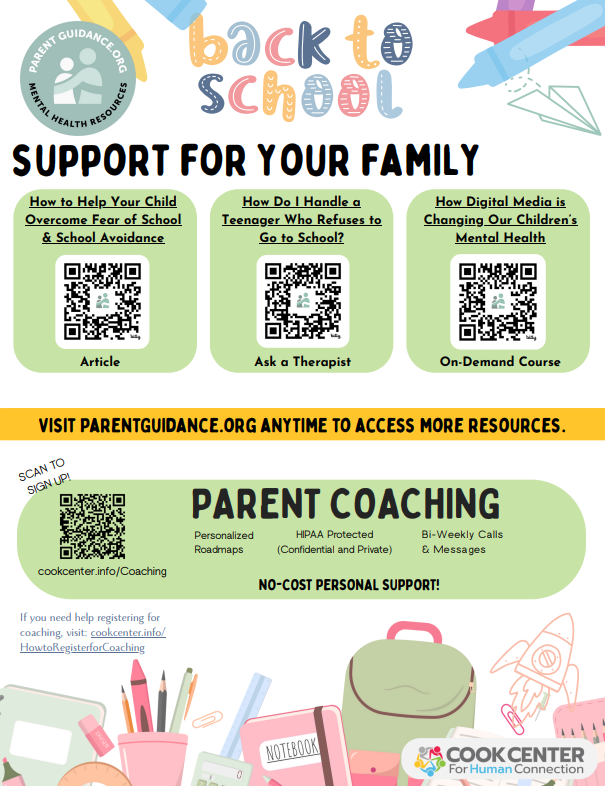🌟 Thank You, Bergoo Baptist! 🌟
Webster County High School would like to extend a heartfelt thank you to Bergoo Baptist Church for their generous donation of products to help stock our Personal Hygiene Closet. 🧴🪥🧼
Your kindness and support make a real difference for our students, and we are so grateful for your partnership in caring for our Highlander family. ❤️🖤
5 months ago, Corri Phillips
👋 Hey Highlanders!
Loved seeing everyone’s first-day fits 🔥—you all looked awesome! Starting tomorrow (8/21/25), we’ll begin enforcing the dress code from the handbook.
Quick reminders:
✅ Shirts need sleeves (at least 1 inch wide) & must cover your waist.
✅ Shorts/skirts/dresses = mid-thigh or longer.
✅ Pants at the waist (no sagging).
✅ No hats/hoods in school.
✅ Keep it school-appropriate (no offensive or drug/alcohol graphics).
5 months ago, Corri Phillips
📢 ATTENTION WCHS JUNIORS & SENIORS
Webster County High School will hold a Parking Permit Meeting THIS WEEK.
✅ Paperwork will be completed
✅ Parking spots will be assigned
👉 Important Reminders:
Students with a VALID driver’s license may drive to school and will not be ticketed before the meeting.
Parking permits are separate from the Student Council Fundraiser. You must have a parking permit first before you can purchase and paint a parking spot.
Let’s get everyone set up for a great year! 🚗🅿️
5 months ago, Corri Phillips
5 months ago, Principal- Mr. Gabriel Markle
WCHS Seniors taking dual credit courses—be sure to sign into Brightspace on Monday, August 18th and follow the directions. Dual credit textbooks will also arrive to WCHS that day. Login here: https://www.glenville.edu/academics/brightspace
5 months ago, Corri Phillips
📣 Stay Connected with Webster County High School! 📣
Hey Highlander family! Stay in the know with all of our upcoming events, important announcements, and school news by visiting our Webster County High School webpage.
📅 You can check our School’s Event Calendar anytime to see what’s happening this month and beyond. Additional events will be added as the school year continues, so be sure to check back often!
🔗 Click here to view:
https://www.wchs.webs.k12.wv.us/o/wchs/events?start_date=2025-08-01&end_date=2025-08-315 months ago, Corri Phillips
A huge shout-out to our custodial crew for working so hard! The freshly waxed floors and all the prep work are making our halls ready to welcome students on August 20th.
📅 Don’t forget!
✨ 7th Grade Move-Up Night – August 18th, 6-8pm
🎓 Freshmen Academy – August 19th, 6:30-8:00pm
We can’t wait to see everyone soon! Go Highlanders!
5 months ago, Corri Phillips
First day of school for Webster County students is August 20, 2025.
6 months ago, Stacey Williams
Join us for a night of family fun and games. On Friday, July 25th, Webster County summer school will be hosting a family game night at Glade Elementary from 4:00-7:30 pm. All Webster County Schools students are welcome.
6 months ago, WC Director of Student and Administrative Support
Join us for an End of Summer Blast in partnership with the Sparta group. On Thursday, July 24th, there will be a family engagement event at Baker's Island from 4:00-7:30 pm. The event is free and open to all Webster County School students.
6 months ago, WC Director of Student and Administrative Support
Free back to school information and resources for families.
6 months ago, Attendance Nutrition & Student Services Director
North Central West Virginia Community Action Agency is conducting a Community Needs Assessment to better understand the causes of poverty, identify community needs, and align our services and resources to meet those needs. If you live or work in Monongalia, Marion, Preston, Taylor, Barbour, Tucker, Randolph, Pocahontas, Greenbrier and Webster County, your feedback is a key part of the needs assessment process. No one knows our community better than you. It will take approximately 10-15 minutes of your time and must be completed at one sitting because it will not save to complete later.
https://www.surveymonkey.com/r/2025NCWVCAACommunitySurvey 6 months ago, WC Director of Student and Administrative Support
Following Governor Morrisey's announcement, summer school and Energy Express will be closed on Thursday, July 3rd, and Friday, July 4th, in observance of Independence Day. Summer school, Energy Express, and the summer feeding program will resume as scheduled on Monday, July 7th.
7 months ago, WC Director of Student and Administrative Support
Summer school and Energy Express will be closed on Friday, June 20th in observance of WV Day. Summer school and Energy Express will resume on Monday, June 23rd. Have a safe and enjoyable weekend.
7 months ago, WC Director of Student and Administrative Support
As your kids return home for the summer, it’s a great time to embrace new routines and
strengthen family connections. Parent Coaching is here to support you every step of the way—
all summer long, and no-cost to parents!
Register for support:
https://cookcenter.info/coaching
7 months ago, Attendance Nutrition & Student Services Director
West Virginia Summer EBT information.
8 months ago, Attendance Nutrition & Student Services Director
Parenting can feel overwhelming—but you’re not alone. Parent Coaching is a no cost resource from your school district that connects you with a coach and expert tools to support your journey. A breath of fresh air is just a click away:
https://cookcenter.info/coaching9 months ago, Attendance Nutrition & Student Services Director

You are invited to join us for an important gathering to help shape the future of our students' success. On Tuesday, May 13th, we will be hosting a Title I parent advisory & strategic planning meeting at the Webster County Board of Education Office beginning at 9:00 am. Parents, guardians, and community stakeholders are invited to join. This meeting will provide an overview of Title I and how Title I supports our schools. There will be an opportunity to plan family engagement events for the upcoming year and collaborate on new and exciting ways to involve families in student success. You will also be able to participate in discussions about our strategic plans, so bring your questions, suggestions, and ideas and join us on May 13th. Please use the QR code above, click the link
https://forms.office.com/r/cdDUQtjBdR, or RSVP by calling or emailing Allison Pyle, Title I Director (304) 847-5638 ext. 2204,
apyle@k12.wv.us or Billie Hamrick, Title I Parent Outreach (304) 847-5638 ext. 2211,
hamrick.billie@k12.wv.us.
9 months ago, WC Director of Student and Administrative Support
10 months ago, WC Director of Student and Administrative Support
We want to hear from you! Please remember to complete the family engagement survey to provide input into the upcoming year's strategic plan. The survey closes Monday, April 14th. The survey is accessible at
https://forms.office.com/r/cdDUQtjBdR or through the QR code. Your input is important, so please tell us what you think.
10 months ago, WC Director of Student and Administrative Support

